| Winners Digest Name |
| S.No. |
Winners Digest |
Year |
Price/Book |
Quantity |
| 1 |
 |
Business Excellence Quality

Winners of Golden Peacock
Quality & Business Excellence |
|
 750 750 |
|
| 2 |
 |
Business Excellence Quality
Winners of Golden Peacock Quality & Business Excellence |
|
 500 500 |
|
| 3 |
 |
Corporate Governance
Winners of Golden Peacock
Corporate Governance |
|
 500 500 |
|
| 4 |
 |
Corporate Social Responsibility
Winners Digest on Corporate Social Responsibility |
|
 750 750 |
|
| 5 |
 |
Corporate Social Responsibility
Winners Digest on Corporate Social Responsibility |
|
 500 500 |
|
| 6 |
 |
Environment Management, Eco-Innovation & Energy Efficiency

Winners Digest on Eco-Innovation, Energy Efficiency and Environment Management |
|
 750 750 |
|
| 7 |
 |
Environment Management, Eco-Innovation & Energy Efficiency
Winners Digest on Eco-Innovation, Energy Efficiency and Environment Management |
|
 500 500 |
|
| 8 |
 |
HR Excellence
Winners of Golden Peacock HR Excellence |
|
 750 750 |
|
| 9 |
 |
HR Excellence
Winners of Golden Peacock
HR Excellence |
|
 500 500 |
|
| 10 |
 |
Innovation Management & Risk Management
Winners Digest on Innovation Management & Risk Management |
|
 500 500 |
|
| 11 |
 |
Innovative Product Service & Training

Winners Digest on Innovative Product/Service & Training |
|
 750 750 |
|
| 12 |
 |
Innovative Product/Service & Training
Winners Digest on Innovative Product/Service & Training |
|
 500 500 |
|
| 13 |
 |
Occupational Health & Safety

Winners Digest on Occupational Health & Safety |
|
 750 750 |
|
| 14 |
 |
Occupational Health & Safety
Winners Digest on Occupational Health & Safety |
|
 500 500 |
|
| 15 |
 |
Sustainability
Winners of Golden Peacock
Sustainability |
|
 500 500 |
|
| 16 |
 |
Sustainability & Risk Management

Winners of Golden Peacock Sustainability |
|
 750 750 |
|
| Publication Name |
| S.No. |
Handbook Name |
Author Name |
Price/Book |
Quantity |
| 1 |
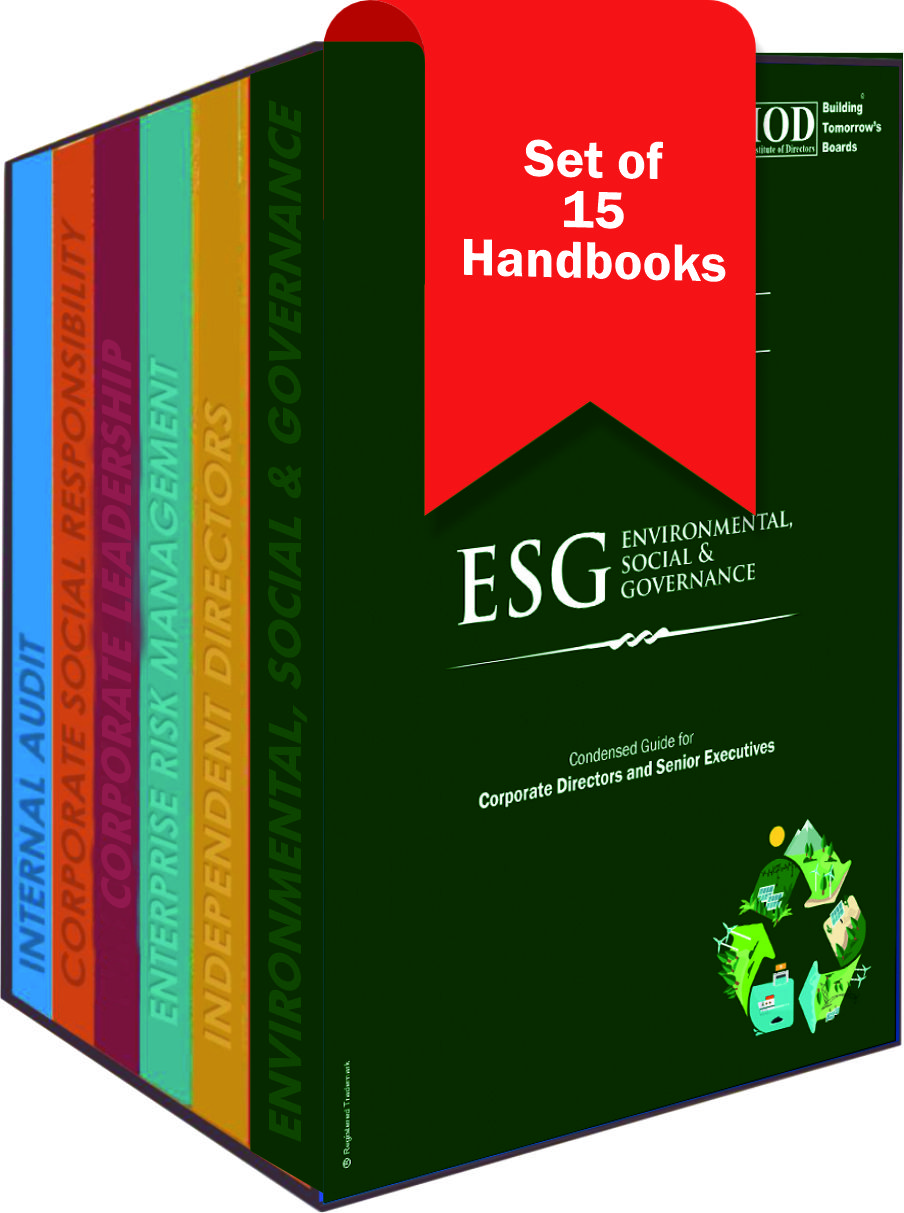 |
A Complete Set of 15 condensed guides & ready reckoners for Corporate Directors
Avail 10% Discount on purchase of Complete Set (** Actual Price Rs. 13,200/-)
Set of Handbooks :
- ESG
- Independent Directors
- Transformative Technologies
- Emotional Intelligence
- Corporate Governance
- Insolvency and Bankruptcy Code
- Corporate Leadership
- The Board
- Change Management
- Corporate Social Responsibility
- Internal Audit
- Innovation Management
- Enterprise Risk Management
- Environment Management System
- Cyber Security
|
Institute of Directors |
 11880 11880 |
|
| 2 |
 |
A Handbook on
CORPORATE LEADERSHIP

With rapid changes due to emerging technologies, business leaders have to adopt and change at a much faster pace than ever before. Technological disruptions have become a norm today and has impacted practically all industries and sectors, starting from healthcare to manufacturing, to computing. Thus, the corporate culture has to change to match a technological revolution and rapidly changing customer requirements. Hence, corporate leadership in the current century requires a proactive approach towards managing change and its impact on long-term organisational growth. Modern leaders will need enhanced cognitive soft skills and abilities, such as communicating effectively, problem solving, interpersonal skills, human relations, team work, decisiveness, tenacity and resilience.
Effective leadership is more important today as digital technology is changing every aspect of how business is to be done. Leaders in the current century need to continuously innovate and manage disruptions effectively. Corporate leaders have to be more agile and resilient in a constantly changing business environment and remain focussed on setting and achieving challenging goals, outperform the competition, solve problems decisively and inspire the workforce to perform at the optimal level.
Rapidly changing consumer demands, induced disruption, increasing fragmentation of markets, rapid changes in economic growth potential and fluid labour markets are factors that will require boardrooms to be highly resilient.
|
Lt. Gen. Surinder Nath, PVSM, AVSM (Retd.) |
 750 750 |
|
| 3 |
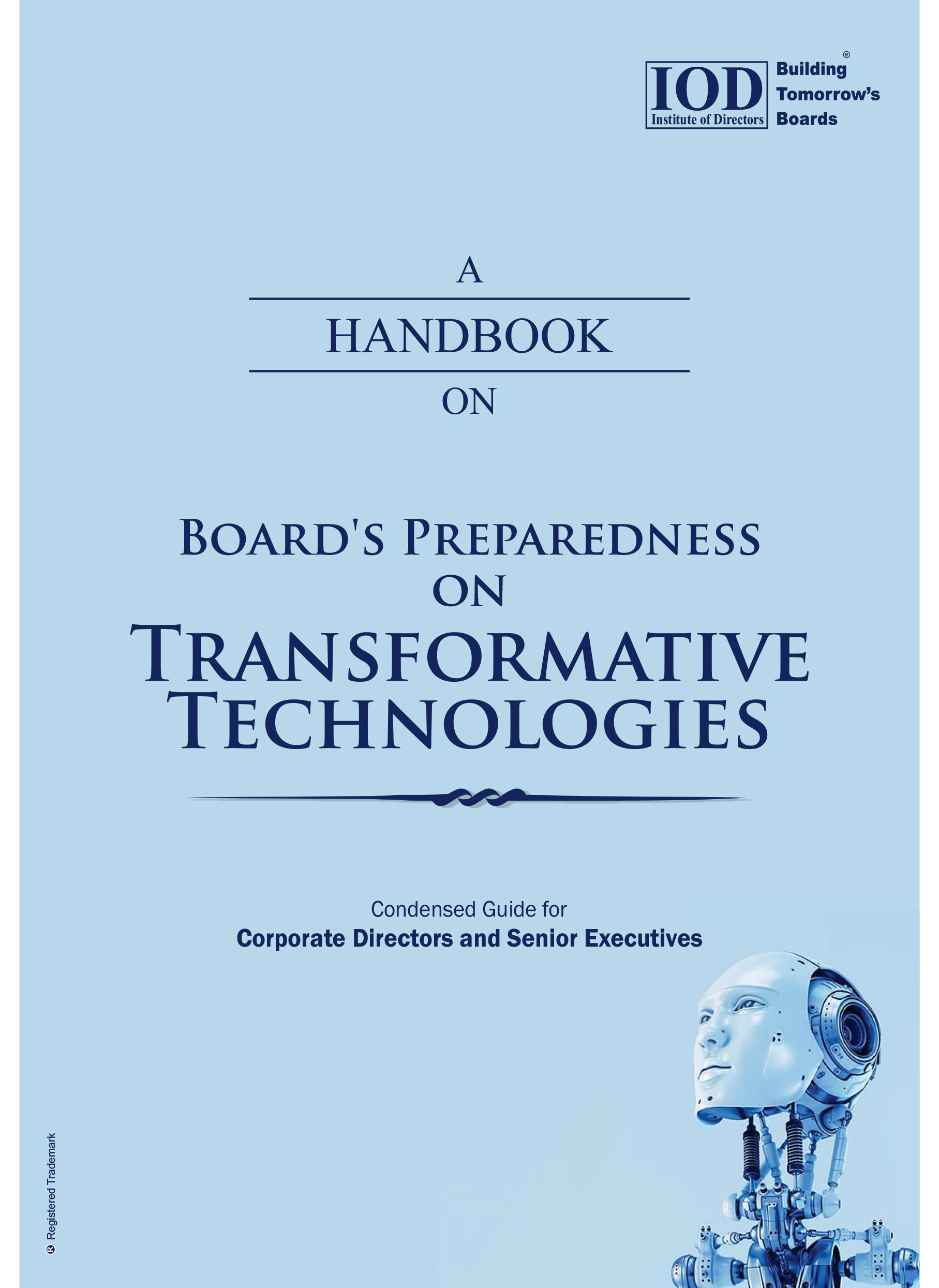 |
A Handbook on Board's Preparedness on Transformative Technologies

This handbook aims to equip you with the necessary knowledge and tools to effectively navigate digital transformation and leverage transformative technologies for sustainable business growth. It explores key concepts, emerging trends, and best practices that will enable boards to adapt to the digital age and make informed decisions.
From understanding the fundamentals of transformative technologies to exploring their implications on governance, strategy, risk management, and innovation, this handbook provides practical insights and case studies.
|
|
 2000 2000 |
|
| 4 |
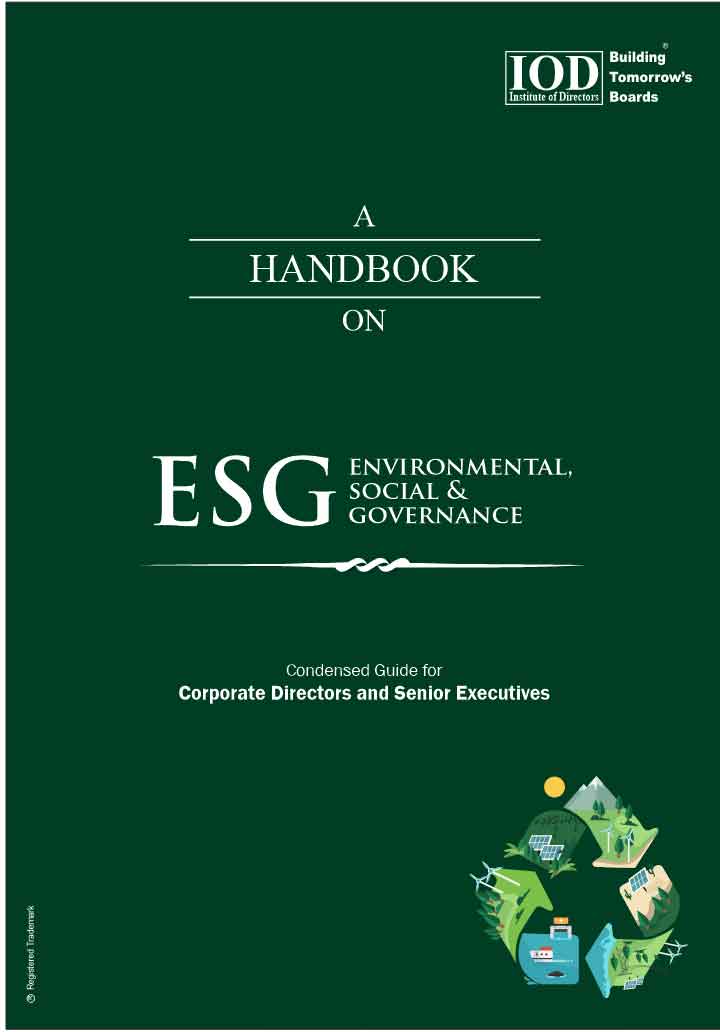 |
A Handbook on Environmental, Social and Governance (ESG)

This Handbook on Environment, Social and Governance (ESG) covers the concepts, components, and the Indian regulatory perspective of ESG. It provides an outline of the SEBI Initiative on ESG Reporting, which includes the BRSR (Business Responsibility and Sustainability Reporting) and the BRSR Core Framework. It connects the principle of ESG with that of Sustainable Development Goals and the Circular economy. It further covers the financial aspect of ESG and also provides a clear understanding of the Carbon Economy in India. |
Institute of Directors |
 2000 2000 |
|
| 5 |
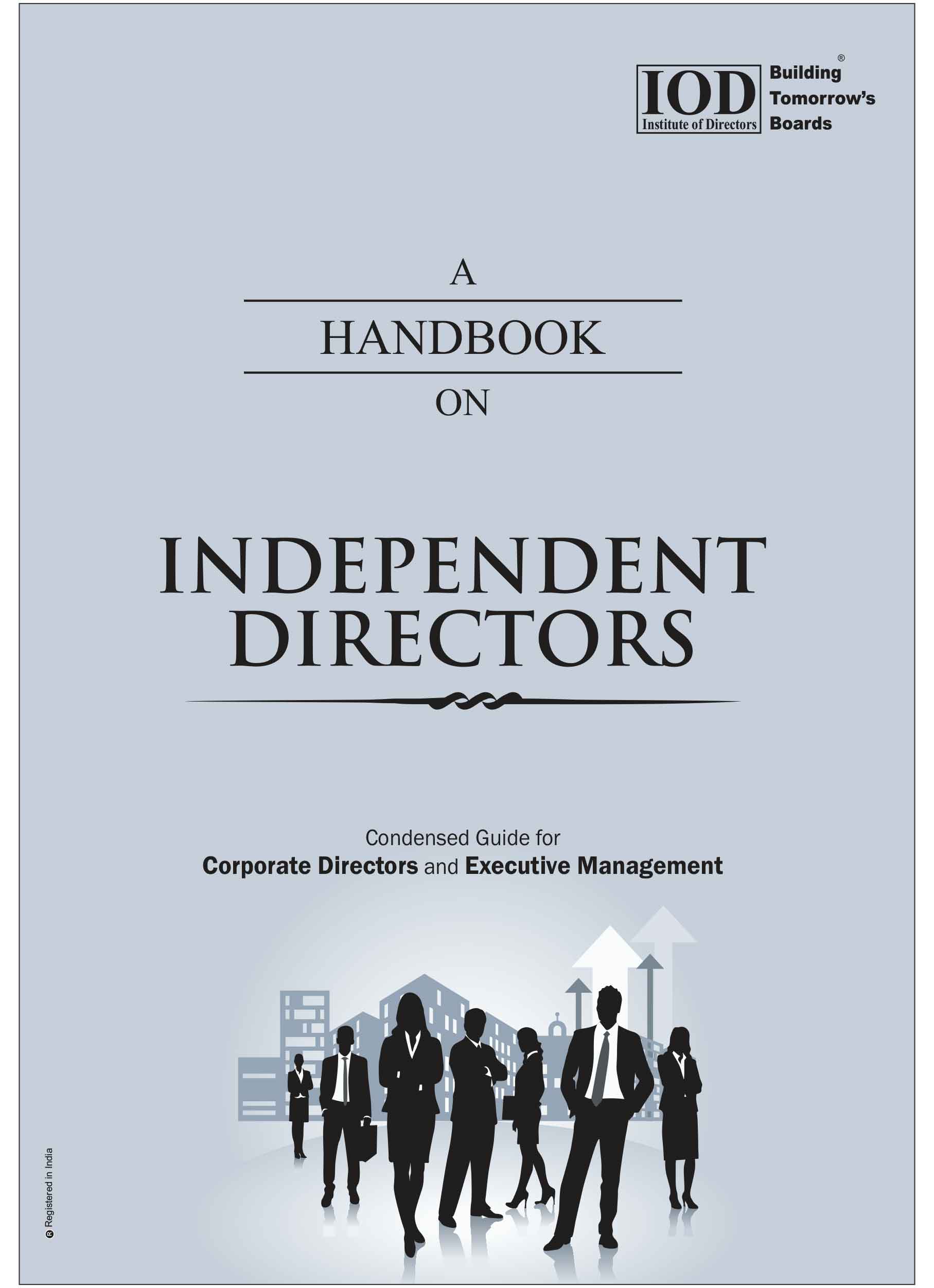 |
A Handbook on Independent Directors

The Handbook on Independent Directors covers the roles, duties, responsibilities and authority of corporate directors. This handbook on Independent Directors is the perfect guide and must have for ID’s who want to have a better understanding of their role in the Board, and perform effectively. It is the perfect tool to help be aware of all aspects of being an Independent Directors.
It consists of:
Safeguards and protection, Performance Evaluation, Remuneration, Appointments, Committees, Resignation & Removal, Code of Conduct and more.
Corporate Governance, Boardroom practices, related corporate and SEBI laws dealing with Independent Directors; and
The multidisciplinary and multifaceted nature of the roles and responsibilities of Independent Directors, in the light of Companies Act 2013, Companies Act 2017, the Companies Act 2020, and SEBI regulation 2015. |
Institute of Directors |
 2000 2000 |
|
| 6 |
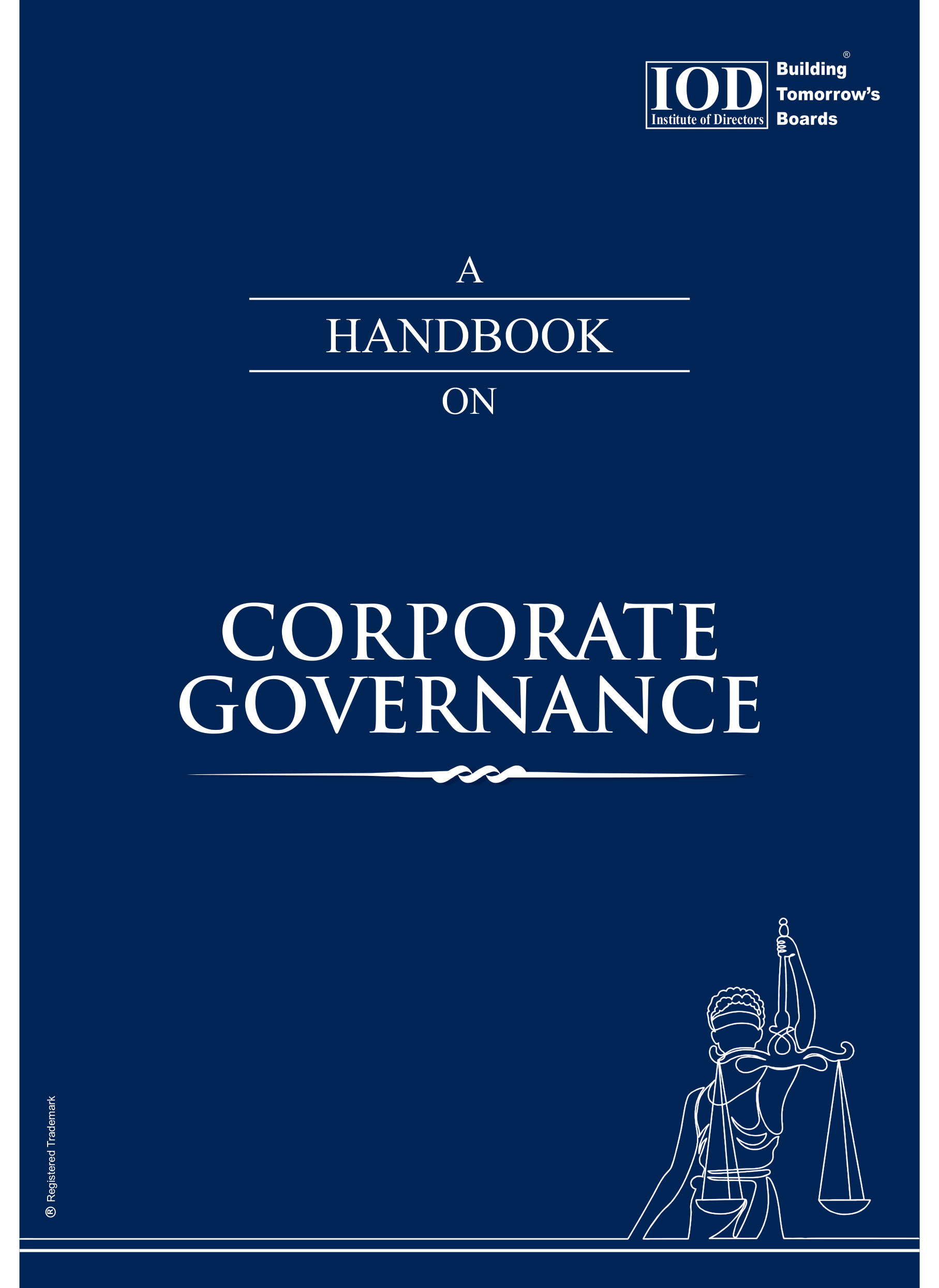 |
A Handbooks on Corporate Governance

Any organisation, whether a business or a non-profit, needs good governance to ensure that it is run in a way that meets the legal and stakeholders expectations. The task of ensuring good governance lies with the Board. This is why this Handbook is exactly what Corporate Leaders and Directors need to assist them. It will act as a 'ready reckoner' for quick reference on Corporate Governance practices and compliance issues, affecting the boardroom and the organisation as a whole.
This Handbook covers topics ranging from Committees, Procedures, Leadership, Family Businesses, Performance Evaluation, trends and more.
|
Lt. Gen. Surinder Nath, PVSM, AVSM (Retd) |
 2000 2000 |
|
| 7 |
 |
Change Management
The handbook on Change Management is a condensed guide for Corporate Directors and Executive Management. It covers the types, dimensions, approaches and dynamics of Change Management in today's scenario. This book represents comprehensive coverage of change management concepts - Individual Change Management, Organizational Change Management and Change Competency. |
Prof. (Dr.) Bala Krishna Moorthy |
 300 300 |
|
| 8 |
 |
Corporate Social Responsibility
This Handbook will be useful to:-
Civil society and non-government organizations working in partnership with Corporate sector to implement their CSR activities.
-
Government officials and local administration (line departments) where such activities are performed.
This Handbook is culmination of information gathered from various sources and is suggestive in nature. It should not be considered exclusivity for
implementation of CSR projects. This Handbook consists of Six Parts that can be broadly defined as follows:
-
Chapter I - An Overview of CSR
- Chapter II - An Overview of significant provisions related to CSR in the Companies Act, 2013 and Rules thereunder
|
Mr. Pradeep Chaturvedi |
 500 500 |
|
| 9 |
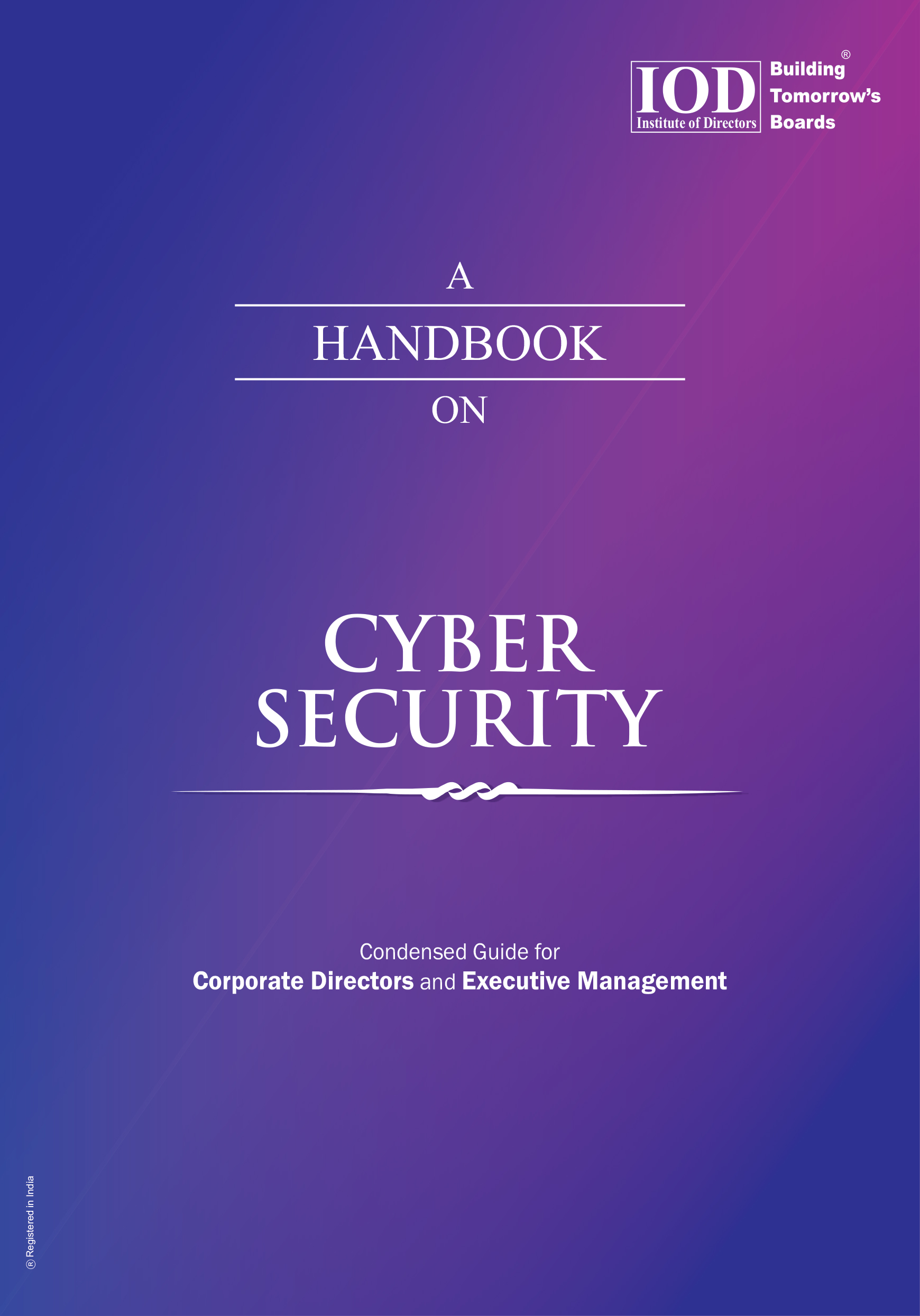 |
Cyber Security

This handbook is a valuable guide for corporate directors for effective cyber risk management. It provides a comprehensive overview of the cyber threat landscape, and of the strategies and technologies for managing cyber risks. It helps organizations build a sustainable model for managing cyber risks to protect its information assets. It familiarizes corporate directors and senior organization leadership with important concepts, regulations and approaches for implementing effective cyber security governance. The contents of the Handbook are well structured and provide Corporate Directors the information and insights that they need to carry out their responsibilities and obligations with respect to cyber security. There are also handy resources spread across the tables and appendices at the end of the book. The Handbook is written in a pleasing and readable style and covers a wide range of cybersecurity issues facing Corporate Directors and business leaders. Overall, an essential resource for Corporate Directors! |
Mr. Ajay Singh |
 500 500 |
|
| 10 |
 |
Emotional Intelligence

This Handbook on Emotional Intelligence can be used as a guide; to help directors better navigate in the following areas:
- Identifying and managing your own emotions
- Persuading and influencing others
- Dealing with difficult colleagues
- Responding to stress productively
- Defusing tense conversations
- Using your feelings as data to help you make smarter decisions
- Avoiding emotional pitfalls in a negotiation
- Reacting to tough situations with resilience
- Helping others on your team develop their emotional intelligence
- Developing a strong emotional culture
|
Major General (Dr.) Tajuddin Mhaisale, VSM |
 500 500 |
|
| 11 |
 |
Enterprise Risk Management
This handbook is a valuable guide at corporate level, on Enterprise Risk Management. It provides a structured integrated, holistic approach towards a sustainable system of Managing Risks. For an organisation to build a sustainable model for creating long term shareholder value, effective management of these risks is of significant importance. The handbook broadly covers:
- Guidelines to the boards for formulating strategy and policy on Risk Management, and Director's role in Managing Risks.
- Overview of major types of Corporate Risks, Enterprise Risk structure, Risk Management, mitigation process, and Risk mitigation toolkit.
- Checklists for Risk evaluation, categorization, mitigation, and reporting.
- Requirements of Corporate Boards and Directors, CEOs, CFOs, and Chief Risk Officers, for assessing and mitigating enterprise wide risks.
- Stakeholders' insights for Risk appetite and Risk Management faced by the organisation.
- Case studies on Risk Management.
|
Institute of Directors |
 500 500 |
|
| 12 |
 |
Environment Management System
This Handbook highlights opportunities and challenges facing the industries, engaged in the processes of Environmental Management for ensuring environmental, social & financial sustainability. It is intended as an informational tool for boardroom professionals, their staff, and their executive management. The areas highlighted include Climate Change, Energy, Water and Waste Management, EMS-ISO14001 certification systems, Global Reporting Initiative (GRI-4), Environment Management Tools, and Environmental Sustainability Aspects. |
Dr. S. N. Pati |
 250 250 |
|
| 13 |
 |
Innovation Management
The Handbook on Innovation is a brief condensed account of what innovation is; how it is developed and managed, and how it affects corporate competitive strategy. It covers the multidisciplinary and multifaceted nature of innovation, it's types, levels and criteria. It gives broad insights into the field of Innovation and Creativity. The Handbook presents many facets of innovation, including it's nature, it's development, it's measurement, it's management and it's social and cultural context. |
Maj. Gen. Tajuddin Mhaisale |
 400 400 |
|
| 14 |
 |
Insolvency and Bankruptcy Code
The Insolvency and Bankruptcy Code (IBC) is the bankruptcy law of India which seeks to consolidate the existing framework by creating a single law for insolvency and bankruptcy. This handbook covers guidance on processes and practices under the IBC. It addresses business needs that board directors seek, as a step in furthering the board's leadership for directing their companies, in a transparent, cultural and ethical manner. This guide provides the basic information essential to a director for interpreting the provisions of the code. It delves into the board's strategic role and insight into value creation, risk taking, accountability, and legal compliance obligations. The object of this handbook is to assist the directors make the significant advance, in the interest of the company and more broadly of society. |
Mr. Ashish Makhija |
 500 500 |
|
| 15 |
 |
Internal Audit
This handbook can be used as a primer on Internal Audit. Internal Audit is now a key element of organizational governance and plays a critical role in protecting and enhancing organizational value. In February 2000, SEBI introduced Clause 49 for listed companies which amongst others established the Audit Committee and laid down its relationship with the internal audit function. The Companies Act, 2013, now mandatorily requires the appointment of an Internal Auditor by the Board for specified companies. This provision has expanded the requirement to cover a much larger number of other public and private companies. The Handbook on Internal Audit covers the fundamentals on internal audit and discusses the internal audit process, tools and techniques used by internal auditors and the statutory provisions relating to internal audit. It also includes guidance on the role of internal audit in areas such as governance, enterprise risk management, internal financial controls and fraud. The handbook provides functional understanding of the subject and is an effective tool for directors even with no background of audit. We believe that this handbook will benefit the directors and the board for them to understand the practice of internal auditing and how it can play an effective role in an organization. It should also assist to discharge their duties and responsibilities. |
Institute of Directors |
 500 500 |
|
| 16 |
 |
The Board
This handbook covers guidance on a diverse range of Boardroom issues, for state-owned, family owned, private, large, small or medium companies. It addresses business needs that board directors seek, as a step in furthering the board's leadership for directing their companies, in a transparent, cultural and ethical manner. This guide provides the basic information essential to an organisation with a board that works. It delves into the board's strategic role and insight into value creation, risk taking, accountability, and legal compliance obligations. The object of this handbook is to assist the directors make the significant advance, in the interest of the owners and more broadly of society |
Mr. Pradeep Chaturvedi |
 500 500 |
|
|
|